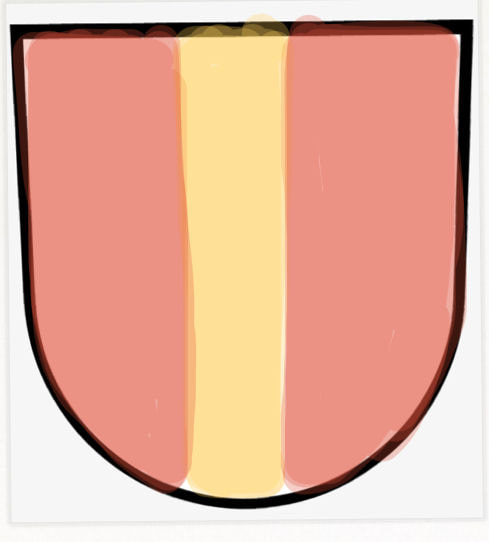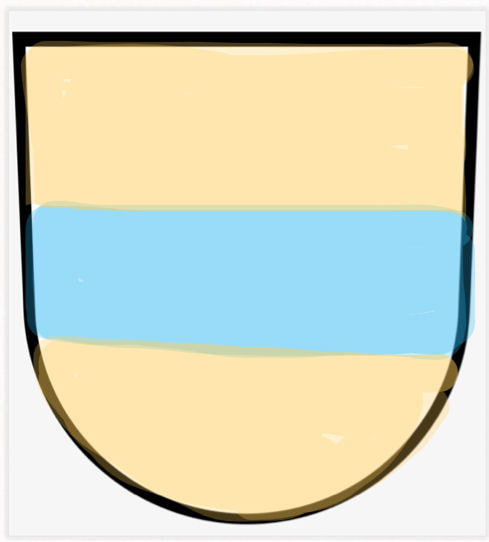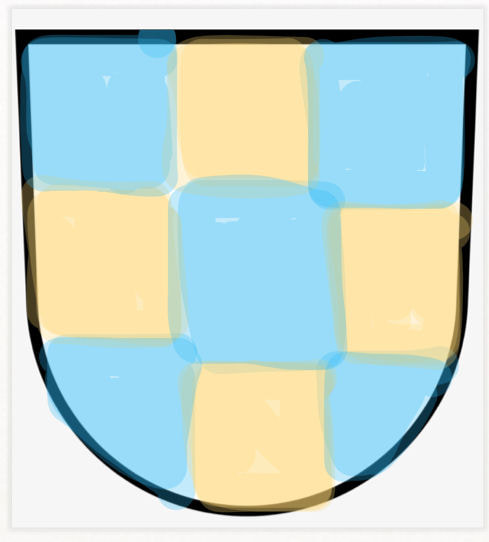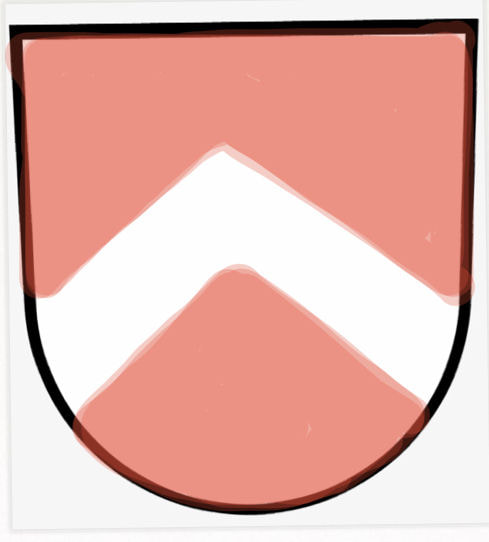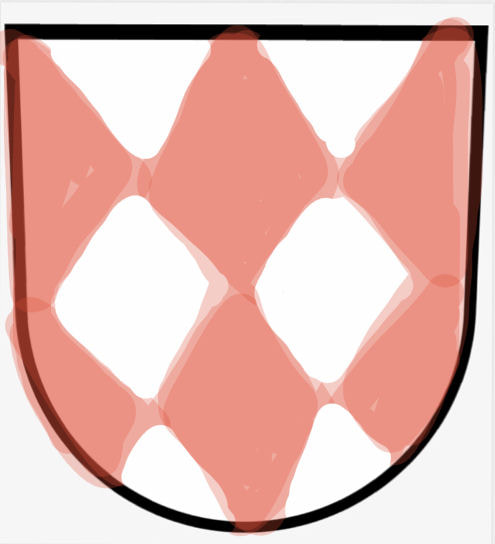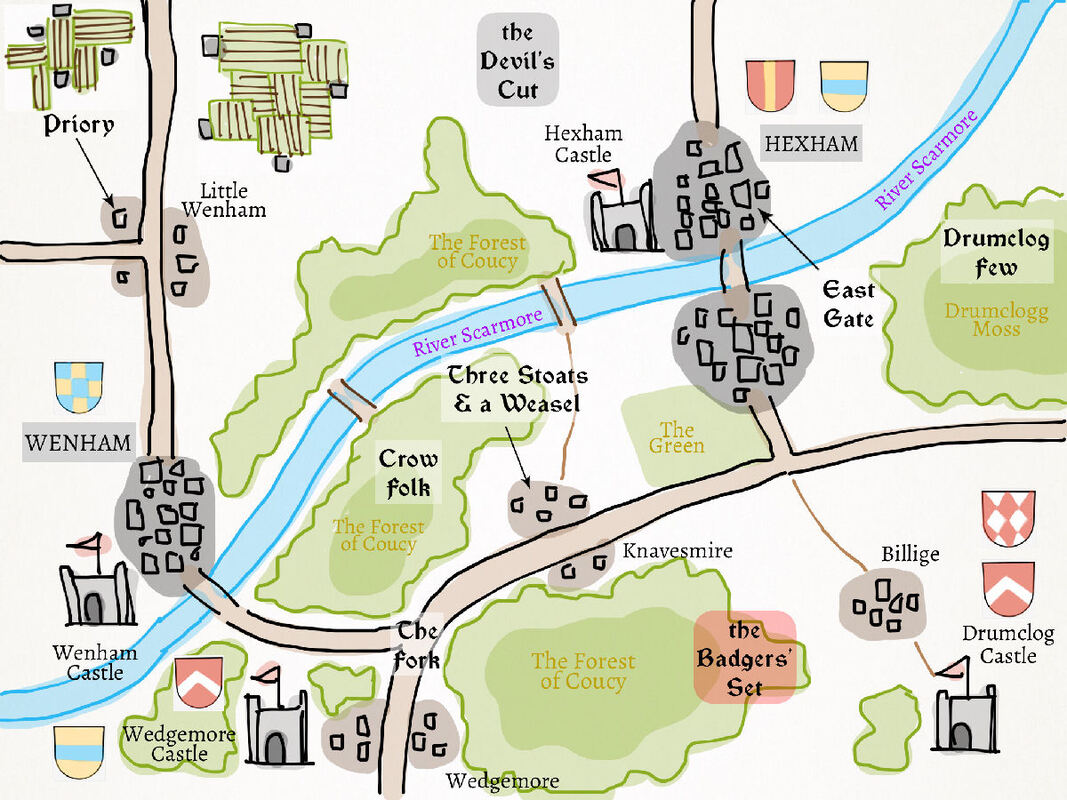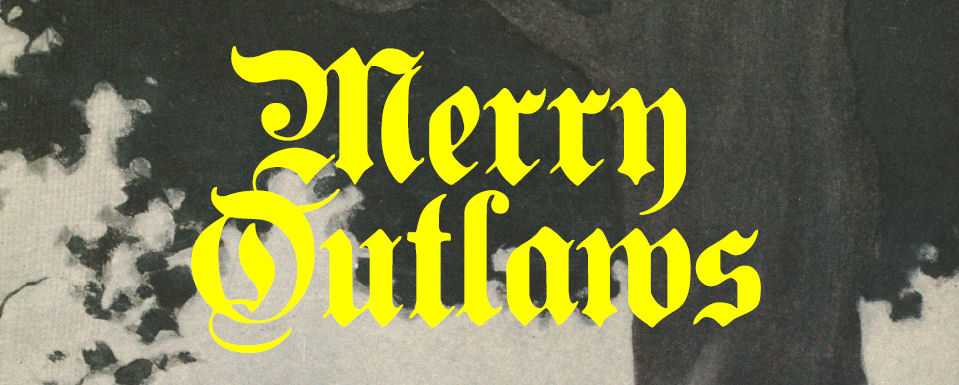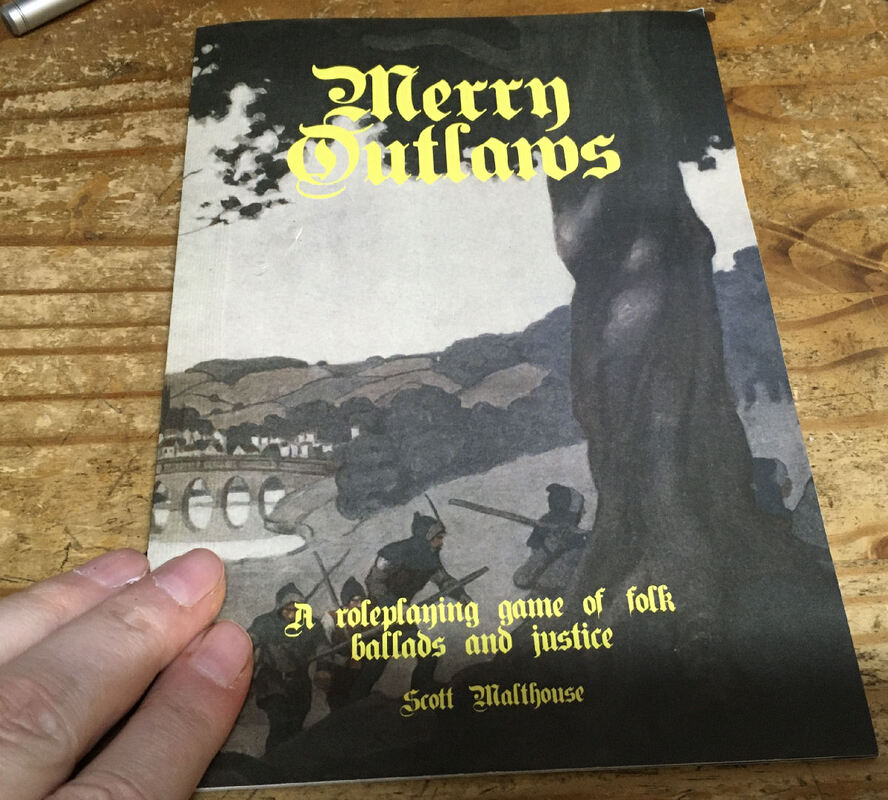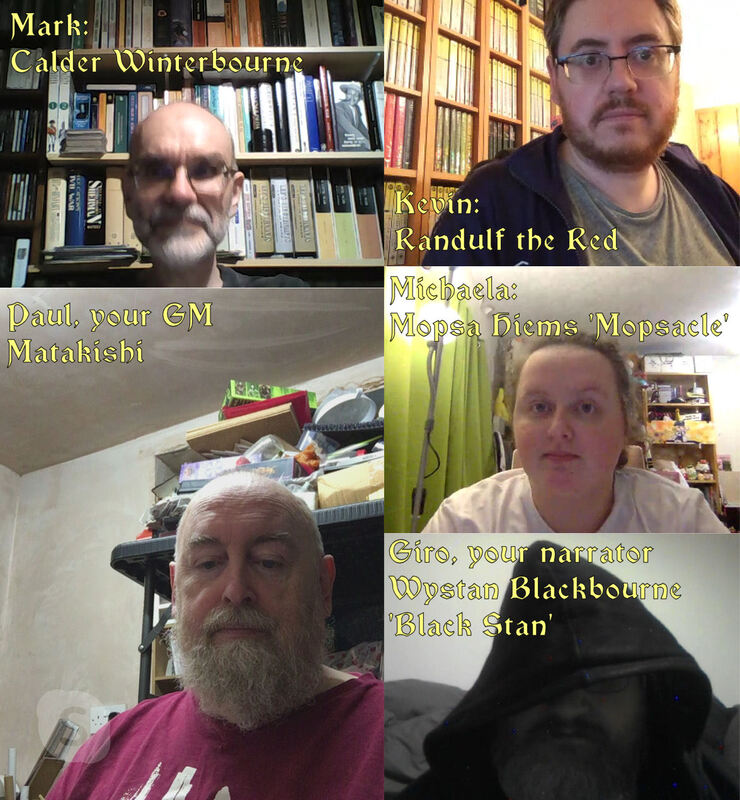|
The Merry Badgers of Billige
Our merry band consists of: Calder Winterbourne a.k.a Mouse Eater - played by Mark. Swift footed and skilled with the bow. Mopsa Hiems a.k.a Mopsacle - played by Michaela. Silver tongued and sharp-eyed. Randulf the Red - played by Kevin. Handy with both fist and mace. Wystan Blackbourne a.k.a. Black Stan - played by Giro. Wilderness traveller, well-informed and keeper of this chronicle. The county of Hexhamshire
Clugney's castle
Barons warring, raiding far Power was their yearning One returned to find in shock His castle razed and burning The plan
Location: The Forest of Coucy. We had learnt that a column of French knights and soldiers led by Sir Gilbert would be travelling to Wedgemore via The Drumclog Moss road and they would be carrying a lot of money! We knew it was going to be soon, in the next day or two and we wanted that money! After much discussion, we formulated a plan. For this to work we would need the help of our Welsh outlaws as well the foresters from Billige, fortunately, they were more than happy to join our cause. Our plan would involve a two-part ambush at Drumclog Moss. The first step was create some traps in the forest, close to the road. Then we would split into two groups, one large and the other small. The foresters would be the smaller group and lie in hiding next to the traps, further along the road from the rest of us. As the column passed the large group, the foresters up ahead would appear on the road, shoot some arrows at the column and run back into the forest Hopefully Sir Gilbert would order a detachment of his men to give chase, then the wily foresters would lead them into the traps. Now that they were distracted and their numbers were lessened, the rest of us in the large group would lunge in and get the money. That was the theory anyway. For now our band consisted of twelve, we left our camp in the morning and travelled to Drumclog Moss without incident. Ambush!
Drumclog Moss was an ancient forest, older than Coucy. The oaks were darker, thicker and more twisted with old roots than ran deep. The bushes and shrubs, denser and somehow more prickly, even the sunlight that shone through its branches seemed weaker. There was an undeniable gloom to the forest, it hung in the air and whispered in the rustling leaves. The south-western edge of the forest had been deforested by Sir Clugney's men for their construction work, the rest however was untouched. The road ran along the southern edge of the forest and that's where we set up our ambush and waited. A few hours passed and the column came past, it was larger than we expected. There were: Seven knights on horseback armed with spears. Two dozen footmen, armed with spear and sword. Thirty heavily laden mules and a equal number of 'civilian' handlers. Truth be told, we hesitated when deciding whether to attack or not; but nothing ventured, nothing gained. We signalled the foresters to do their thing. They stepped out on to the road and loosed some shafts at the column, one of the knights slumped to the ground. Orders were barked in French, three knights and six footmen gave chase. Was it enough? Could we deal with the remainder of the soldiers? Should we go for the money? We were denied our decision. Suddenly, out of nowhere, another band of outlaws from a different part of the forest jumped out of the bushes and swooped down on ropes to attack! Their numbers were large, but they were even more shabby than us. With tattered clothes, they were covered in filth, many of them disfigured or missing limbs. They mostly wielded rudimentary wooden weapons and did not look like much of a match for the professional French soldiers they were attacking. Quickly we assessed the situation: The knights chasing our foresters had baulked at the tree line, aware they would lose their advantage in the trees, they were currently wheeling their horses round to return. The footmen at least had disappeared into the forest. Meanwhile at the column, a sprawling melee had begun, as the entire military company focussed on the battle at hand. Unfortunately as we had surmised, the other outlaws were taking losses and were on the back foot. We saw that the handlers were struggling with the mules. We also saw that eight of the mules were carrying chests. The distraction would not last much longer, it was now or never. We charged in, our plan was simple, there were eight mules and eight of us, one mule apiece. Brandishing our weapons we advanced on the mules and drove the handlers away, some required a 'touch more persuasion' than others it must be said. As we were grabbing our targets, we slapped the other mules, hoping to panic them. Meanwhile the handlers had regrouped, they considered mobbing us, but too late! We had escaped into the forest. The Drumclog Few
Our plan now was to march through the centre of Drumclog Moss to the northern side. Hopefully this would dissuade any and all pursuers. Few were the trails that we trod as they ran their ways through the deep hollows and otherworldly dells. The unaware could easily lose themselves in the quiet gloom here. Fortunately we managed to navigate it without mishap and eventually caught sight of the forest's edge. We stopped here. our next move was to wait for nightfall before returning to our camp. If we were lucky, the hue and cry would have died down by then. A few hours passed uneventfully, but the silence was broken by the distinct crack of a snapping twig. Leaping to our feet, shocked that we had been ambushed; we prepared to fight the soldiers. We were most definitely not expecting who we saw next. There stood a small ragged looking man, covered in sores and infections, he was also letting off an incredible smell. He introduced himself as 'Leaking Sam' a member of 'The Drumclog Few' and that he spoke for their leader 'Hugh the Silent'! Sam politely explained that the mules belong to him. We disagreed, stating that they were ours, we had them, not The Drumclog Few. As we were speaking a giant of a man appeared behind Sam, about seven foot tall and carrying a club, we noticed that his ears had been cut off. Sam explained that this giant was Hugh, he led The Drumclog Few with his charisma and leadership. Hugh silently looked at us. Beyond Hugh, we saw many more people emerging from behind the shadowed trees, like Sam and Hugh, they were disfigured or sickly and dressed in rags. They may have been named The Drumclog Few, but in number they were many. We noticed amongst the crowd our four foresters held prisoner, they were bound and struggling. It also did not escape our notice that these were possibly the most impoverished people we had met and surely deserving at least a portion of what we had stolen, they had certainly paid a price for it. We made them an offer of two mules, but Sam refused it. Sam then glanced at Hugh for a few seconds then announced that there would be a contest for the mules. The Drumclog Few champion verses our champion. Hugh pointedly stared at Mopsa. We negotiated the terms of the contest with Sam. In the end we agreed to give five mules to The Drumclog Few and keep two for ourselves, the contest would be over a single mule. Our champion was Randulf, surprisingly their champion was not Hugh, but Sam! Both were given a quarterstaff and the contest began! Sam was quick, surprisingly so in fact and they rapidly exchanged strikes and blows. Randulf's experience held him in good stead here and he managed to land several telling blows on Sam who stepped back and yielded, complimenting Randulf on his fighting skills. Everyone applauded. Victory was ours, as was the third mule and the foresters, now freed. With that, The Drumclog Few bid us farewell, slipping away back into the remote part of the forest that they inhabited. Now with three mules, we waited until night finally came and exited the forest. Circling Drumclog Moss, we travelled cross country, avoiding all contact as best we could. Soon enough we arrived at the Drumclog Moss Road, crossing over would be the riskiest part of our journey. Cautiously we watched both ways on the road and had to avoid a torch-carrying patrol before crossing over and returning to camp. Rumours
Even though it was quite late, we counted our spoils, there were six thousand french coins in all, two thousand per chest. As was fair, we gave one chest to the foresters, who after splitting it four ways were very happy with their haul. We warned them to be careful, flashing around so many french coins around so soon after the ambush might draw suspicion on them. As they sauntered off, they rather unconvincingly told us that they 'would bear it in mind'. We still had four thousand coins to distribute! Morning arrived and we had decided to take a chest of coins to Friar Nicholas in Hexham. The journey was unremarkable, but upon reaching the town gates at mid-morning, we saw more guards posted here than usual. We would need to exercise extra caution with them. Our concern was unfounded and we entered Hexham without a hitch, the guards were barely paying us any attention and were focused on watching the inward bound road . Something was up, was this to do with the ambush? Before going to visit the good friar, we thought it prudent to hear some local news. This of course meant frequenting the local tavern, a reluctant task for all of us. Chat and gossip spread as freely in Hexham as anywhere else, which means to say; it spread a lot! Several rumours and stories were 'doing the rounds': - Lady Margaret was pregnant. - Building work has been undertaken at Knavesmire. Sir Clugney intends to rebuild all the cottages there. - There was an unsuccessful attack on a convoy led by The Drumclog Few. - Drumclog Castle is also being rebuilt by Sir Clugney, once the largest castle in the region, it might be again in days to come. Some of this was not news to us, but the rebuilding of Knavesmire was something we had not heard of until now. Next we sought out Friar Nicholas and handed over a chest of two thousand French coins to disperse as he saw fit. Finally, we decided to go and see Lady Margaret. The ring that she had gifted us granted passage to her chambers in Hexham Castle. Lady Margaret
Lady Margaret was in a foul mood. We asked what vexed her so? She replied that Sir Conrad's patrols were roaming Sir Clugney's lands and picking fights with his men. Sir Conrad had also threatened Sir Roland by sending men into his lands. It seemed to us that Lady Margaret championed Sir Clugney, was cold towards her husband Sir Roland and was contemptuous of Sir Conrad. As she spoke we noticed a new object in her chamber: It depicted a strange little house or cottage with two stones outside it, perhaps it was a shrine of some sort? Although definitely not Christian in origin. Lady Margaret saw us looking at it and explained that it was a gift from Osirc, he had called it a 'lare', a symbol of good luck from his country. As she told us this, she made the same gesture we had seen from Osric. Whilst looking at the lare, it seemed as if the front of the house might open up...? It was at this point that Lady Margaret distracted us away from it by saying she was busy and ushered us out of her chamber. After our abrupt exit, we looked for Krea. Unable to spot her, we inquired with the other ladies-in-waiting. Krea had been cleaning some curtains in the castle and had fallen out of the window, tumbling to her death! "She was flighty, but could not fly." Lady Margaret had commented darkly. Things did not seem right here at all. There was nothing left for us to do in Hexham, so we discussed our next move. The news of construction work at Knavesmire had piqued our curiosity, we also wanted to check in on our friend Emlyn. So, off to Knavesmire we went. Knavesmire burns!
We followed the Drumclog Moss road westward until it headed through the forest. A mile or so out of Knavesmire, rising up through the gaps in the trees, we saw a column of curling black smoke, the acrid smell of burning also hung in the air. There was a big fire ahead, it had to be in Knavesmire. Driven by urgency, we quickened our pace and hurried onward. Our arrival was met with what could only be described as a apocalyptic sight. Smoke, thick and black lingered above the village, shrouding it in darkness, the sun had been reduced to a hazy dim orange globe. Walking into Knavesmire was like walking into a hellish red twilight lit by the roaring conflagration that was consuming nearly every house. The heat was immense and our eyes were stung by the smoke, even the maypole was burning. Leopold and his family were desperately hurling bucket upon bucket of water on to their inn. Thus far, it had not been reached by the fire. As fast as the fire was spreading, so was the panic. Soldiers in Sir Conrad's colours were here; unbelievably some of them wielded flaming brands and were torching the houses. The remaining soldiers were caught up in a prolonged melee with an enemy dressed all inl black! The Crow Folk no doubt, who had emerged from the forest to battle the soldiers. Caught in this crossfire were the hapless villagers, the fighting left them unable to save anything except their lives and even there, they were failing. In between filling and emptying buckets, Leopold managed to tell us that Sir Conrad's men had ridden into Knavesmire bearing already lit torches and began setting houses alight. Soon after that The Crow Folk appeared and fighting broke out. Even we were left staggered by what we saw. Who should we help? Conrad's men, or The Crow Folk? Both seemed equally bad. Before long however, the tide of the battle shifted and The Crow Folk began gaining the upper hand. Sir Conrad's men were pushed back and forced to retreat. We found one of Conrad's soldiers left behind, he was badly wounded and in a bad way. We moved him from the burning buildings and bound his wounds as best we could. Before he died, he told us that he had been ordered here and Sir Conrad was 'fighting back' against Sir Clugney. By now The Crow Folk had disappeared and only the villagers remained, hopelessly trying to end the fires. It seemed a lost cause though, even the piles of building materials bought into the village for the rebuilding we had heard about were burning. We helped the villagers extinguish the fires, but the damage had been done. No house had escaped the burning and barely any even still stood. Only the inn had survived untouched - and that because it stood apart from the houses. Knavesmire was littered with the dead and the homeless, these survivors set about the grim task of burying the fallen. After some discussion amongst us, we decided to lead the survivors to Billige. We would give them a thousand coins from the final chest we had 'liberated'. They could use that money to buy lodging in Billige until more housing was built. Hopefully the materials from the Drumclog Castle could be used for this. It did not take the people of Knavesmire long to prepare for the short march, most of their belongings had been reduced to ash. Billige is attacked too
The blackened remains of the village were left behind and it was late afternoon by the time we all reached Billige. Our arrival had stirred quite a commotion as well as unease at the fate of Knavesmire. Still, the people of Billige were generous enough to put up the Knavesmire folk, at least as long as the coins were flowing anyway. It had been a long day, but as late as it was, the day was far from over. Even though we were away from ruined Knavesmire, we were not beyond the reach of Sir Conrad. As the sun sunk behind the western horizon and night was nearly upon us, we spied the approach of riders, closing fast along the trail from the north. With them they carried lit flickering torches, the torches numbered perhaps a dozen and the riders double that. Sir Conrad was brazen to strike so deep into Sir Clugney's domain. The Knavesmires survivors had seen this scene a scant few hours before, they fled Billige screaming and running for the shelter of the forest. We knew that there had to be at least a small company of Sir Clugney's men at Drumclog castle, the village's fastest runner was dispatched to fetch them. Meanwhile we told the women and children to flee towards the castle. We did our best to quickly arm any volunteers who remained, luckily the foresters numbered among them. The gloom of night was beginning to settle in, but the rider's torches made an adequate target for our arrows. We loosed two volleys at them and cut down half their band, our foresters proved their worth here, landing many a telling shot. Their charge faltered and halted, they milled about, unsure of how to proceed. We could not and would not relent, we had to press our advantage and loosed off another volley. The riders turned and fled, we continued attacking. By the time they were out of range, only two of them had escaped. Quickly, we scooped up their weapons and handed them out to the villagers. Swift and emphatic had been our victory, so swift in fact that the reinforcements were nowhere to be seen! When they did arrive, we realised that they were French. Mercenaries? We thought it best to avoid them and melted into the night, only the villagers' accounts of our actions remained. Enough is enough
To our camp we returned, a place we had now named as 'The Badger Set'. It had been a long day, but before retiring for the night, we discussed the day's many events. We came to one conclusion: all three of these rulers were corrupt and unworthy. - Sir Clugney was hatching some nefarious plot which involved a foreign power. - Sir Conrad was a thug, plain and simple. - Sir Roland was indifferent to the suffering around him. We decided that all three of them 'needed dealing with and had to go'! The next morning we awoke invigorated, driven by our new sense of purpose. Little time was needed in choosing our next course of action: We had denied Sir Clugney sixteen thousand coins! Now was the time to twist that knife in the wound. The journey to Wedgemore was quiet and uneventful. When we arrived, we did not immediately enter; a host of soldiers had congregated in the town. We saw Sir Clugney's tatty household guard, Sir Gaston Chatsworth's men and a company of mercenaries. They were milling about listlessly, waiting for marching orders no doubt. From the outskirts, Wedgemore seemed a prosperous town, well made cottages surrounded a pleasant town square. There was a nice looking inn too, 'The Looted Chapel'. Since this was the seat of Clugney's power, we were thus unsurprised to see one of Osric's maypoles here. Only the church was run down. The irony of the inn's name had not slipped by us. Despite the town's apparent wealth, Wedgemore Castle was as dilapidated as the church or the uniforms on Sir Clugney's men. It had seen better days and was partway through a renovation, woodwork constructions dotted the curtain wall and inner keep, like oaken bandages covering over the castle's failings. The castle itself was relatively small and surrounded by a dry moat. After evaluating the situation, it did not seem dangerous to enter Wedgemore, we were far away from Hexham and Drumclog Moss. Strolling in we noticed a significant number of lares, they were spread throughout the town, by the maypole, the inn and many of the houses. Seemingly identical to the one we had seen in Lady Margaret's chamber, only these were open and the two little statues were 'inside' the house. We also noticed fewer townsfolk about than we would have expected for a town of this size, perhaps they were indoors? Even so. this gathering of soldiers was source of much talk in the town and we easily learnt that Sir Clugney had ordered the 'southern road' from 'The Fork' barricaded, he was mustering forces for a counter attack. In two days hence, Sir Gaston would arrive from the south with more men and they would be ready. We headed into the inn, the innkeeper saw us enter and gave us a 'Roman greeting gesture'. It was an unusual place: the walls were decorated with old, faded paintings that depicted ancient Roman gods and mythical creatures. The floor partially consisted of a Roman mosaic. The innkeeper introduced himself as 'Sestus'. A Roman name, he explained, there was a Roman villa here long ago and the inn had Roman heritage. Parts of it had been built with masonry from the villa. Like much of the town, the inn possessed a lare. Sestus saw us look at it, we gave him Osric's gesture and he responded in kind, smiling and satisfied. Having scouted out both the town and castle. We now had a plan in mind and departed Wedgemore; in two days we would be back. For most of those two days we made preparations and gathered our allies before returning to Wedgemore. After we arrived, we waited. Waited until Sir Gaston arrived with another column of troops. They joined the other soldiers here. The next day, at mid morning, amongst the blaring of trumpets and flying of flags, the soldiers marched north out of Wedgemore, towards The Fork and war with Conrad. With the soldiers gone, the town seemed almost unnaturally still and silent. Clugney Castle had been emptied of soldiers, we estimated that there were twelve soldiers left. Four on the gate, four on the walls and four on patrol. The destruction of castle Clugney
It was time for the first part of our plan. With our allies we numbered twelve. Eight of us disguised ourselves in Clugney's colours. The remaining four dressed as Conrad's men and their hands were loosely bound, giving the appearance of being much tighter. Now in disguise, we approached the castle gate. There were four guards there and they converged on us. Mopsa stepped forward and explained to the guards that we were returning with four 'prisoners' for the cells. It was a convincing lie, the guards congratulated us on their capture and called for four other guards to escort us to the keep. These guards led us to the grimy, dim cells within the keep and then asked us to hand custody of our prisoners over. Pausing for a moment, we locked eyes with each other before pouncing on the guards. The ambush was successful and we subdued them before they had any opportunity to raise the alarm. We were now free to search the keep unhindered, soon enough we found Sir Clugney's money chest. A sturdy box that was bolted to floor. Opening it revealed a small, shallow layer of coins, it only contained seven hundred coins at our estimate. Clugney must really have needed the money we denied him. Seven hundred coins would not last him very long, that didn't stop us taking all of them though! Now that we had Clugney's money, it was time to leave. There was no need for subtlety here, the twelve of us went up to the four guards at the gate and demanded they surrender. Outnumbered three-to-one, they wisely decided not to fight. We then did the same with the remaining four guards on the walls. Then there were no guards. We had considered occupying the castle, the look on Clugney's face would have been exquisite, but it was not to be... Our last act before leaving Wedgemore Castle was to set light to it, the stonework would survive with some damage, but all the wooden additions would be reduced to dust. From the safety of the forest, we could hear the wood crackling as it burned and watched the flames lick the sky. It was a start, we had weakened Clugney, but who knew the strength of his allies abroad? Now we had to wait for the outcome of his battle with Conrad before planning our next step. So ended the fifth outing of The Merry Badgers of Billige. You can buy your own copy of Merry Outlaws here:
These write-ups by Giro can be read on his excellent website Three Spellcasters and a Dwarf before they appear here.
|
Merry Outlaws
In this RPG, players follow in the footsteps of Robin Hood. Robbing the rich to pay the poor, fighting the injustice and corruption that persists in sunny England. Merry Outlaws is definitely a 'lite' RPG. It runs to just over twelve pages - including evocative illustrations. The rules are well laid out to view on screen and simple to understand. Everything is handled by rolling one or two six sided dice, the higher the better. When rolled this will produce one of four results that are analogous to; very good, good, fail, and critical fail. Combat is handled in the same way. Character creation is as simple as can be roll for (or pick) a personal code, two abilities and two starting items and a weaon. If a PC has a pertinent ability or some other advantage, they have an edge. Conversely, if a PC has a disadvantage, then they have a setback. This is a advantage/disadvantage mechanic. Finally we have character progression, this is where the game stands out. Merry Outlaws eschews the usual XP or level-up paradigm. Instead players are forging their own legend through the creation of a ballad! At the end of every adventure each player creates a stanza - a four-line poem to add to their ballad. As players continue their adventures, their balled will lengthen. Additionally, as they accumulate stanzas, they will acquire new abilities. Once a character has ten stanzas in their ballad, they retire. All in all a short, sweet and simple RPG. Worth trying if that's your cup of tea. The Adventure
The Players
Because of lockdown, we're playing over Skype. The Ballad of Mopsa Hiems 'Mopsacle'
Rumble rumble in the village We shout and perform in little Billige Down the road and through the woods Defeating great Giles, who thought we could? Father and daughter reunited, To save poor Alice we can’t be short-sighted Back at the mill, held against their will “Here they are, the real witches" "Come Mr Merick and smack these bitches” Wedding gown stolen, Three feathers in its place We rushed through the forest There was no time to waste Traps nor Crows could not stop us We’d get it, come what may 400 gold for the dress returned Priceless to save her day Announced as outlaws A friend sentenced to hang To save his life, We’ll go out with a bang A nun walks into a jail Three friends walk out free, Face off at the dye guild A crow lets out his final plea An ambush by the inn, The crows flock once again, A plot to poison a friend, A dastardly deed orchestrated by men. A Dozen Badgers plan a heist, Drumclog few get in on the fight, Burning confusion within a village, We stand proud an' strong at great Billige. The Ballad of Black Stan
Fine Alice from Billige, accused. Blodwin gone, was kidnapped. A witches trial we denied. And thus, Giles got slapped! A horrific sight encountered. Three feathers up the arse! By crows, the bride's gown was stolen. Saved, reward to folk, passed. Emlyn unjustly imprisoned. A pal not forsaken. A crow and dyer conspire. Justice and coin taken. The errand squire we did find. Poison plot uncovered.. To a Priory we did go. An ally discovered. Gilbert's coins, a generous gift. Knavesmire 'tween a fight. Conrad thwarted, Clugney attacked. His keep we set alight. The Ballad of Randulf the Red
Stand and listen gentlefolk A giant cometh across the land Let us speak of a grappling God Randulf the Red, brute of his band With a grin he wrestled the best Tankards of mead followed a great draw With sweep of his arms, bandits were battled Until the ghastly one was no more He climbed great oaken trees To take the crow men by surprise To save a maidens wedding day He became the master of disguise Loyal friends are captured Rescued by friar and nun Once three birds of a feather One crow down, a traitor undone A poisonous plot And the swoop of the Crow For such heroics toward Our Lady A token of friendship she did bestow A raid on the rich, a parley struck Beside fellow outlaws, sorely deformed As tension flamed, villages did burn Against the oppressors, The Badgers then stormed The ballad of Calder Winterbourne
It is unclear where or when the ‘Ballad of Calder Winterbourne’ originated. No copy exists with provenance earlier than the mid-fifteenth century (and that only a fragment). It is likely that early versions have been adapted by others over the centuries and sections re-written or entirely new text added, perhaps to add contemporary references, incorporate unrelated fragments or cover situations likely to be familiar to new, later readers. There is, for example, an oblique reference to a possible act of enclosure in the prologue, which must either be a poor transcription or later addition to a supposedly ‘medieval’ text. No reference to Calder Winterbourne exists in the historical record and it is therefore likely that, if he ever existed, his story has been greatly embellished or his tale is a combination of several stories combined in a convenient narrative thread.’‘It is unclear where or when the ‘Ballad of Calder Winterbourne’ originated. No copy exists with provenance earlier than the mid-fifteenth century (and that only a fragment). It is likely that early versions have been adapted by others over the centuries and sections re-written or entirely new text added, perhaps to add contemporary references, incorporate unrelated fragments or cover situations likely to be familiar to new, later readers. There is, for example, an oblique reference to a possible act of enclosure in the prologue, which must either be a poor transcription or later addition to a supposedly ‘medieval’ text. No reference to Calder Winterbourne exists in the historical record and it is therefore likely that, if he ever existed, his story has been greatly embellished or his tale is a combination of several stories combined in a convenient narrative thread.’ Prologue Calder Winterbourne, archer bold Born afar in Blackmore Vale Full man o’war, full man o’peace Far-sighted, swift and hale. Served his lord full time in France Gave all honour and duty. Came back with naught but empty hands Nowhere a sign of booty. Returned to see the Vale closed down The villagers all evicted Saith he ‘I served ignoble lords Now shall I never more’. Calder has taken to his travels. He wanders near and far Trusts not the rich, befriends the poor, Takes all men as they are. Part One To hear a blacksmith’s tale of woe His daughter held by Giles Another woman held for trial A witch? A slander vile. Four foresters guide to Giles tower Outside henchmen in force. All take stock and arrows nock, A bold rush is the course. Calder’s arrows fly and two men die Giles slain in dreadful fight. His henchmen turn and see the light The blacksmith’s daughter is aright. A witch is held for loss of flour, The miller is distraught The cause is naught but pilfering Yet from a bloodstained thought. A forester’s been done to death His friends the guides are grieving. A blackmailed man is stealing flour To hide innocence with thieving. Now truth is out and witch is freed, No charge in any eyes. Loot found, restored, in easy shares And a new-named Calder Wise. Part Two Now safely camped in de Courcy They look t’ward easy living A blameless life, an end to strife, Days of gathering and giving. But Black Crows are in the meadows Wat Taylor’s going to burn The Crows have stole a wedding dress All honour do they spurn. At Knavesmire side Wat’s wounds they bind Carter Emlyn aids them. They take their rest and full refreshed By Odo and Crispin’s singing. The village fills with gentry’d folk To Hexham their road winds A missing dress? Oh woe! Distress! All are commanded ‘Find!’ Great search ensues as trouble brews, For Mannering’s men are slacking. Courcy’s crew their search renew They need no other backing. They track their foes, the evil Crows, Black Stan has heard their calling, And Mopsacle undoes their traps, At all points Crows are falling. To search Crows’ nest without arrest: How, in a camp this size? A simple feat for crew includes Randulf, Lord of Disguise! Now Mopsacle has found the dress, To Hexham heroes hurry. Return of gown lifts bridal frown And frees her mind from worry. In gratitude, reward is made Wedding party is delighted. Crew bids adieu and melts from view Now troths can all be plighted. The cost of dress drawn with duress From common folk to vex them A shadow falls within town walls: Sheriff Rolfe, the curse of Hexham. “Reward’s not ours – the people gave, Now we can make amends. Money goes to those in need Through Friars and our friends. Part Three News cross the land: all wake, all stand! A holiday in season! But dreadful word; for no good reason, Emlyn will hang for treason. To cast more dark on happy Saint’s Day The friends are now all outlaw. It frees their hands to make a stand Fight injustice as they saw. In Hexham town Emlyn is bound And lies in reeking bower. Stan and Wat are took by Sheriff’s crooks All held in Eastgate Tower. Their friends rush in to break them out, There’s close and nasty fighting All are now saved, rope’s end denied! Now to Wat’s home, for hiding. The Dyers Guild sold Wat to Sheriff: They are due a reckoning. The crew close in on Guildhall door, Trader’s entrance is a-beckoning. Calder holds the staff enthralled, Speaking words of honey. Friends search the house, creep cat and mouse, All following the money. Guildmaster Lister speaks in whispers Dealing with Edward Crow. Crow brethren leader mocks and jeers – Ranulf fells him with one blow. “Tis done, Crows hate no more or less Than when that man was living. Good Friars still take what we gain And see the poor are shriven.” Carter and all the Taylor folk, Subject to lies unseeming, Must leave the town and join the camp Beneath the oak trees greening. And what shall be this brave band’s theme? All sett – the Billige Badgers? Clad in simple Hexham Green, their role – A knee in the Sheriff’s nadgers! Notes from the expanded second edition of the renamed ‘English Folk Songs, Ballads and Verse’ (1895): ‘The author (or authors) now appear to regret the choice of third person as the voice of the ballad, with the appearance of apparently direct speech from Part 2 onward. Almost inevitably this will be complete fiction and should not be taken as reporting of actual conversation. Part 3 ends on a rather coarse and vulgar note, possibly reflecting the limited range of rhyme available for ‘badger’ and the author’s frustration at possible future limitations. If inclined toward sympathy, readers should note first the (unverified and probably apocryphal) comment attributed to Christina Rossetti: ‘At least they weren’t a French gang living in Orange’ Part Four The world is in a turmoil Badgers seek and snuffle round. There’s money in the villages Noses to the ground! Where’s the money coming in from? Why are maypoles growing here? Which lord is up, which lord is down – Let’s think on’t over beer. Why is Conrad’s squire in Knavesmire? A physick for Lady M? For she has the morning sickness It’s a panacea for them. But the potion is of hemlock Just a foul Socratic brew Badgers know a milder herbal Goodly Alice tells them true. Badgers now in Wenham find The potion brewer’s lair But they dally and they tarry Deal in nothing but hot air. So they’re off to Lady Margaret Nought must upset the borning She grants them all her favour In gratitude for warning. But why are Gascons in the bailey? Why did Klea take a fall? Foreign cash abounds for Clugney – Will the outlaws hear it call? So the Badgers make a plan to seize The treasure train from France Coin here will feed the poor once more Badgers prepare a merry dance! Part Five Badgers lurk on Drumclog Moss ‘Til treasure train appears. Their eyes are fixed on mule-packed gold: All ready, no-one fears. But the trap is sprung by a ragged band, A mob that no-one knew. A starving group down on their luck The undaunted Drumclog Few. Hugh is the leader of The Few Badgers challenge, Hugh defiant. The quarterstaffs spit fire, and then After hurricane, the quiet. The treasure shared, all part as friends Money now with friars to share. But Wenham’s full of stranger tales Almost too much to bear. Lady Margaret’s Clugney’s friend And will not hear of Conrad. More shrines appearing all round town Must drive good Churchmen mad. Now down the road Knavesmire’s alight, Black Crows defend it stoutly. Badgers shepherd the villagers To Billige for their safety. Horsemen from Hexham harry home Billige is all a-fever. Badgers stand, protect their friends And help defeat the reivers. In Wedgemore’s where it comes together Waiting for Chatsworth’s presence. Though shrines are found all round the town None can explain their essence. (Editor’s note: there appears to be another stanza, or possibly two, here but the only existing copy of this section is badly damaged. It appears to mention a raid on castle, but the text is near illegible.) |


